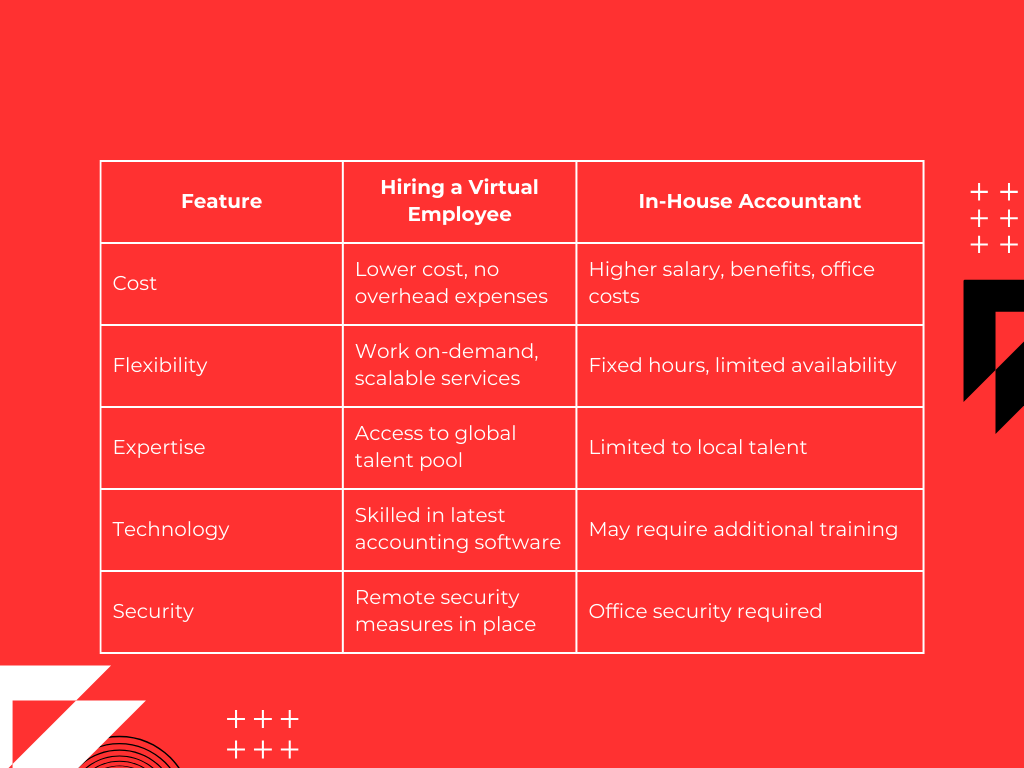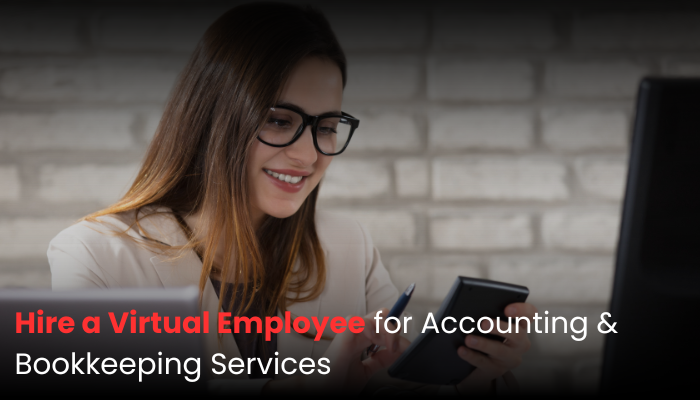Businesses are constantly looking for ways to optimize costs, improve efficiency, and maintain financial accuracy. In such a scenario, opting to hire a virtual employee for accounting and bookkeeping services is the smart and scalable solution.
For startups, small businesses, or large corporations, outsourcing financial management will result in significant time savings, lower overhead expenses, and guaranteed tax compliance.
In this article, we will explore the benefits of hiring a virtual employee for accounting and bookkeeping, how to find the right professional, and key considerations before making a decision.
Why Should You Hire a Virtual Employee for Accounting & Bookkeeping?
Managing finances is a crucial yet time-consuming aspect of running a business. By choosing to hire a virtual employee, you can delegate accounting and bookkeeping responsibilities to a qualified professional while focusing on core business activities. Here’s why this approach is beneficial.
Cost-Effective Solution
Hiring an in-house accountant requires you to pay for salaries, benefits, office space, and other expenses. However, when you hire a virtual employee, you only pay for the work done. This cost-effective approach allows businesses to maintain financial accuracy without the added burden of hiring full-time staff.
Access to Skilled Professionals
Virtual employees specializing in accounting and bookkeeping often have years of experience, certifications, and training in financial management. They are well-versed in using accounting software such as QuickBooks, Xero, and FreshBooks, ensuring accuracy in financial reporting.
Increased Productivity and Efficiency
By outsourcing financial tasks, business owners can focus on growth and revenue generation. Virtual accountants handle bookkeeping, payroll processing, tax preparation, and financial analysis, ensuring that financial records remain up to date without disrupting daily operations.
Scalability and Flexibility
When you hire a virtual employee, you have the flexibility to scale up or down based on business needs. Whether you need full-time, part-time, or project-based assistance, virtual employees can adapt to your requirements without long-term contracts or commitments.
Secure and Compliant Financial Management
Experienced virtual accountants understand tax regulations, compliance requirements, and financial best practices. They help businesses avoid financial pitfalls, penalties, and errors that could lead to audits or legal issues.
How to Hire a Virtual Employee for Accounting & Bookkeeping
Choosing the right virtual accountant is essential for ensuring accuracy, reliability, and financial stability. Follow these steps to hire a virtual employee who meets your business needs:
Define Your Accounting Needs
Before you start searching for a virtual accountant, determine the specific financial tasks you need help with. Some common services include:
- Bookkeeping and financial recordkeeping
- Tax preparation and compliance
- Payroll processing
- Accounts payable and receivable
- Budgeting and financial forecasting
Clearly outlining your requirements will help you find a professional with the right skills and experience.
Look for Qualifications and Certifications
When hiring a virtual employee for accounting and bookkeeping, consider professionals with relevant qualifications such as:
- Certified Public Accountant (CPA)
- Chartered Accountant (CA)
- Certified Bookkeeper (CB)
- QuickBooks or Xero certification
These credentials ensure that the virtual employee has the necessary expertise to handle complex financial tasks.
Choose a Reputable Hiring Platform
There are several platforms where you can hire a virtual employee for accounting and bookkeeping services, including:
- Upwork
- Freelancer
- Toptal
- PeoplePerHour
- Fiverr
These platforms allow you to review profiles, check ratings, and interview candidates before making a hiring decision.
Assess Technical and Software Skills
A good virtual accountant should be proficient in using financial software and tools. Ensure that they have experience with:
- QuickBooks, Xero, or FreshBooks
- Microsoft Excel or Google Sheets
- Payroll management systems
- Tax filing software
Testing their software knowledge through a trial task can help you gauge their expertise.
Conduct a Thorough Interview
During the interview process, ask relevant questions to assess the candidate’s experience, problem-solving abilities, and communication skills. Some useful questions include:
- How many years of experience do you have in accounting and bookkeeping?
- What accounting software are you proficient in?
- Have you worked with businesses in my industry?
- How do you ensure financial data security?
These questions will help you determine if the virtual accountant is the right fit for your business.
Benefits of Hiring a Virtual Employee for Accounting vs. In-House Staff
Many businesses debate whether to hire an in-house accountant or opt for a virtual employee. Here’s how hiring a virtual employee compares to traditional in-house staffing.

Based on this comparison, it’s clear that hiring a virtual employee offers more flexibility, cost savings, and access to specialized expertise.
Challenges and Solutions When Hiring a Virtual Employee
While there are numerous benefits to hiring a virtual employee, there are also challenges that businesses must address. Here’s how to overcome them:
Data Security Concerns
Since accounting involves sensitive financial data, security is a top priority. Solution: Use encrypted communication channels, multi-factor authentication, and cloud-based accounting software with security features.
Communication Barriers
Time zone differences and remote work settings may lead to miscommunication. Solution: Set clear expectations, use collaboration tools like Slack or Zoom, and schedule regular meetings.
Quality Control
Ensuring the accuracy of financial reports is essential. Solution: Establish performance metrics, request periodic reports, and conduct regular audits.
By addressing these challenges, businesses can effectively hire a virtual employee while maintaining financial integrity.
All in all
Hiring a virtual employee for accounting and bookkeeping is a smart decision for businesses looking to streamline financial operations, reduce costs, and maintain compliance. With access to skilled professionals, flexible hiring options, and advanced accounting tools, businesses can improve efficiency while focusing on growth.
By following best practices for hiring, setting clear expectations, and ensuring data security, you can build a successful partnership with a virtual accountant. Whether you need help with bookkeeping, tax preparation, or payroll management, hiring a virtual employee is the perfect solution for your financial needs.
Ready to hire a virtual employee for your accounting tasks? Start your search today and experience the benefits of virtual bookkeeping for your business!
 :
https://www.pinterest.com/inveduss/
:
https://www.pinterest.com/inveduss/












